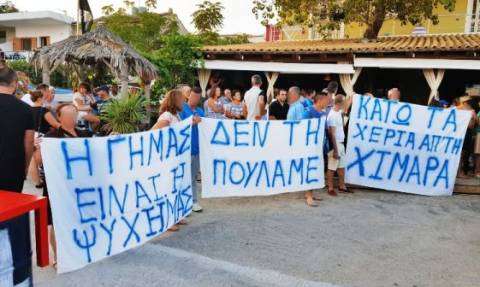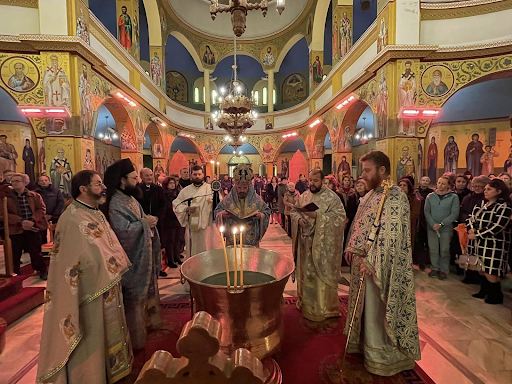ΗΛΕΚΤΡΟΝΙΚΉ ΕΦΗΜΕΡΙΣ ΠΟΛΙΤΙΣΤΙΚΉ ΙΣΤΟΡΙΚΉ ΟΡΘΌΔΟΞΗ ΤΩΝ ΚΟΡΥΤΣΑΙΩΝ ΗΠΕΙΡΩΤΏΝ - GAZETË ELEKTRONIKE, KULTURORE, HISTORIKE, ORTHODHOKSE E KORÇARËVE EPIROTË
Παρασκευή 20 Ιανουαρίου 2023
Πέμπτη 19 Ιανουαρίου 2023
Linguistic Maintenance and Cultural Idiosyncrasies in Greece’s Arvanitic Speaking Communities-Mesimi i Arvanishtes ne Greqine e fundit te shekullit te 19-te dhe fillimt te shekullit te 20-te; Ruajtja e gjuhes dhe vecorite kulturore te komuniteteve Arvanishtfolese ne Greqi.
Theodore G. Zervas
(Chicago)
Historical Origins
Most historians agree that the Arvanites first settled central and southern Greece in the thirteenth
century. A succession of migrations into Greece continued
until the early nineteenth century. The Arvanites are thought to have
originated from parts of present day Albania.
Their identity has been linked to their
Arvanitic (Arvanitika) or Tosk Albanian language and their practice of Greek Orthodox Christianity.
One
of the earliest accounts to mention the Arvanites is from Anna Comnema (1083–1153 ACE) in the twelfth century,
where she briefly
describes a town
and people from Durrës in present day Albania called Arbanus (Sewter 2009).
It is here, that contemporary historians believe the name Arvanite or Αρβανíτες originated. Later
Byzantine accounts describe them as Christians
who settled in parts of present day
southern Albania and northwestern Greece. It is also said that they were
encour- aged by Byzantine officials
to migrate south in undeveloped and
under-populated ar- eas of Central Greece
and the Peloponnese where many of these communities still live today.
Historians and anthropologists
continue to debate the Arvanites geographic and ethnic origins. Some have characterized them as a “hybrid”
Greek/Albanian culture since they speak both Greek and Albanian while others mostly nationalists in both Greece and Albanian
have claimed them to be purely Greek or purely Albanian.
For
nearly 900 years Arvanite towns were scattered
around Athens in
Attica, Central Greece,
Southern Euboea, Corinth,
the Argolis, western
Laconia and many of
the Soronic and Cycladic Islands in the Aegean. For some time the Arvanites was Greece’s biggest public secret in that the
Greek state had always been aware of them, but reluctant
to acknowledge that the language
they spoke was not Greek (Mag- liveras 2009).
After the creation of the modern
Greek state in 1827 the Arvanites identified as being almost exclusively
Greek or Greek
Orthodox Christians, but
preferred to speak Arvanitic instead
of Greek. The Greek state
had also seen
them this way, mainly because
they had participated the Greek Revolution and had been active in the political
and cultural life of Greece.
At the same time, the Arvanites remained mysterious and many Greeks assumed that the Arvanitic language was ancient northern Greek dialect. But when Albanian immigrants began flooding into Greece in the 1990s (after the collapse of communism in Albania) it became apparent that Arvanitic was not Greek at all, but an “old” Tosk Albanian dialect. Arvanite communities nonetheless clung to their Greek national identity. They found it offensive to be called Albanians and were quick to point out differences between themselves and the Albanian immigrants.
While Greek and Albanian are distinct languages within the Indo-European clas- sification of languages, they share many similarities in syntax and grammar. There are even ancient Greek words in the Arvanitic that are not used in Modern Greek. The word for mouse, μι in Arvanitic, is the ancient Greek word for mouse μις. Νουκ for the contraction “not” in Arvanitic is suspected to derive from the ancient Greek of ουκ. The Arvanitic word for house, στεπή is also thought to derive from the ancient Greek word σκεπή. Similarly, hades is often used when referring to the underworld or afterlife. There are about 30 ancient Greek loan words in Arvanitic, but many lin- guists suspect that there are likely more. At the same time, colloquial Greek has adopted many Albanian words. George Babiniotis attributes about 50–75 words used in Modern Greek that derive from Tosk Albanian (Babiniotis 1998). Some examples include: γκομáρι for donkey, γουβα for ditch, λουλουδι for flower, μπέσα for the intransitive verb “come”, καλικουτσα to carry on ones back, λουτσα to be soaked, σβέρκος for neck, and σíγουρα, for the adverb “clearly” or “certainly”.
Παρασκευή 13 Ιανουαρίου 2023
Κυριακή 8 Ιανουαρίου 2023
Το επόμενο παράδοξο από τα Τίρανα, η AOZ στο Διεθνές Δικαστήριο, η Αλβανία γυρίζει πίσω, προετοιμάζεται ξανά για τεχνικές διαπραγματεύσεις με την Ελλάδα
Σάββατο 7 Ιανουαρίου 2023
Ενισχύστε οικονομικά την προσπάθεια μας!
-
Κορυτσά το 1994 Korça 1994 Οι φωτογραφίες που ακολουθούν είναι τραβηγμένες το 1994 από το φωτογράφο Josef Koudelka .... Fotogra...
-
Το φαινόμενο Θεοφάνης Μαυρομάτης (Φαν Νόλι) Η σκοτεινή πλευρά της Σελήνης Fenomeni Theofan Mavromati (Fan Noli) Ana e er...
-
[Φωτο: Φιρμάνι του Αλή Πασά, 1810, γραμμένο σε δημοτική γλώσσα. Όλες οι διαταγές και συμφωνίες του Αλή διατυπώνονταν στην καθ...
-
Faqja e parë e Gazetës Greko- Shqiptare SOTIRIA-SHPËTIMI, të botuar nga Ismail Qemali. Pjesë nga artikulli i dytë mbi Destinacionin e Hel...













